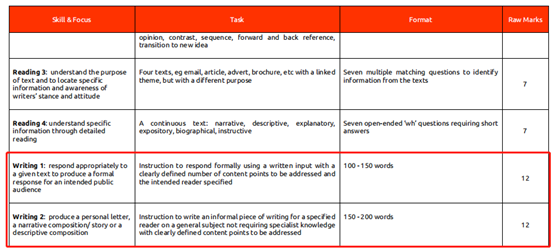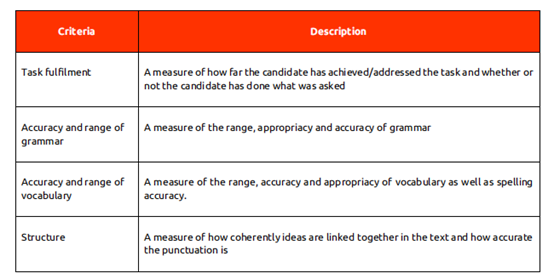备考指导 | 朗思B2写作如何评分

从B2 Communication级别开始就进入到一个相对难度较高的级别,不少考生在B2备考过程中会觉得难度较B1级别提高了不少。尤其是写作部分,不少考生在之前B1考试过程中取得了不错的分数,而B2考试写作单项成绩只在25分(pass线),甚至还没有到25分。
更多留学考生因为习惯于传统考试写作部分议论文写作(不少考生从了解英语写作开始就准备的是议论文写作),对于朗思实用文体、记叙文写作反而感到陌生,考试过程中得分不理想,从而感到朗思写作比传统其他标化考试还难。
那么今天就和各位考生具体分析下朗思笔试考试写作部分是如何给分的。朗思笔试考试满分150分,其中写作满分是50分;笔试结果依据总分打分,0-74分为Fail,75-100分为Pass;101分以上为High Pass。笔试评分没有单项最低分数的要求(部分学校可能有具体要求,请参考学校具体要求)。
1.0 了解朗思的考核逻辑
朗思是一个分级英文考试,往往很多考生和家长都更关注朗思与传统标化考试(例如:雅思、剑桥英语考试)有什么共同点。这点非常容易理解,因为作为一个新进入中国市场的英语测评,多数考生都是从传统考试转考朗思的,考试准备、机构教学更是建立在传统英语考试之上的。但需要在朗思考试中取得理想成绩,就更需要了解朗思考试与传统考试的区别,尤其是朗思考试的考核重点。
之前和考官们交流,大家一致的观点是朗思考试有着很高的友好度——几乎没有什么刻意为难考生的题目,完全是考核考生的英语实际水平。朗思考核角度与传统的剑桥系列考试不同,更注重语言的实用性——是通过给定场景下不同语言功能实现情况,来考核考生的英语实际使用能力。因此考生需要在朗思考试中展现出来的是使用英语达到特定语言功能的能力(例如陈述、争辩、解释……)
B2 级别要求(Functions - Communicator Level – B2)
Personal environment
· asking for and giving personal information
· describing where one lives (accommodation, area etc)
· asking and answering questions for confirmation, information, identification
· describing people, places, things
· correcting information
· explaining routines
· narrating and describing past, present and future events
· comparing things, people
· reporting facts, actions
· stating facts, actions
· giving descriptions and specifications
Expressing thoughts, feelings and attitudes
· expressing and asking about agreement or disagreement
· denying something
· expressing agreement reluctantly or with reservations
· conceding a point or argument, demurring
· expressing views and feelings with reasons
· asserting and asking about knowledge or ignorance of something or someone
· stating whether a person, thing or action is remembered or forgotten
· enquiring of someone else whether a person, thing or action is remembered or forgotten
· stating and asking about degrees of probability/possibility
· expressing, denying or asking about necessity (including logical deduction)
· stating and asking about one’s certainty or uncertainty of something
· reminding someone to do something
· expressing doubt, incredulity, bewilderment
· hypothesising
· stating and asking about one’s ability or inability to do something
· stating and enquiring about one’s obligation (or lack of) to do something
· seeking, granting or denying permission
· stating and asking about the permissibility of doing something
· expressing and asking about wishes, hopes, expectations
· expressing and asking about wants, desires, needs
· stating and asking about intention
· stating, responding to and asking about preference
· expressing and asking about likes and dislikes, with reasons
· expressing and asking about (dis)pleasure, (un)happiness
· expressing and asking about satisfaction or dissatisfaction
· expressing disappointment
· expressing gratitude
· expressing and asking about interest or lack of it
· expressing surprise or lack of it
· expressing and asking about fear, worry, anxiety
· giving reassurance
· expressing regret, sympathy, condolence
· expressing fellow-feeling, empathy
· expressing and asking about pain, anguish, suffering
· expressing relief
· expressing indifference
· expressing fatigue, resignation
· offering and accepting an apology
· granting forgiveness
· expressing and asking about approval, appreciation or disapproval
· expressing moral obligation
· expressing regret
· accepting, attaching or denying blame for something
Making things happen
· responding to a request
· requesting something, or requesting someone to do something
· inviting someone to do something
· accepting or declining an offer or invitation
· giving instructions or orders
· giving and asking for advice
· responding to or rejecting advice, with reasons
· warning others to be careful or to stop doing something
· offering and requesting assistance
· insisting politely
· persuading someone to do something
· suggesting a course of action
· asking for, responding to, agreeing to or rejecting suggestions with reason/alternative
· making and agreeing plans and arrangements
· encouraging someone to do something
· reaching a compromise
· prohibiting someone from doing something
· making a complaint
· refusing to do something, expressing defiance
· pleading with someone to do something
Social contact
· getting someone’s attention
· greeting people and responding to greetings
· expressing thanks
· addressing somebody
· making and responding to formal and informal introductions
· opening, closing a formal or informal conversation
· congratulating someone
· praising someone
· paying someone a compliment
· asking someone’s opinion
· making someone feel welcome
· indicating lack of understanding
· giving and asking for clarification, explanation or definition of something
· confirming one’s own or another’s understanding
· asking someone to repeat all or part of something
· asking someone to speak more slowly
· asking for help in finding words or phrases
· asking for and giving the spelling and meaning of words
· counting and using numbers
· asking for and telling people the time, day, date
· interrupting politely
· objecting, protesting
· exemplifying or emphasising
· classifying, generalising, defining something
· encouraging another speaker to continue
· indicating a wish to continue or finish speaking
· summing up
· taking leave
· observing telephone conventions
2.0 B2级别笔试写作任务
要了解了考核重点和维度,我们就得看下具体B2级别写作任务:

B2级别要求写两篇作文:
我们先以以下官方样题看一看实际写作题目要求。第一篇要求写参观体育馆的评论,需要提及三个方面:1、设备质量;2、整体氛围;3、轻松使用;字数在100 - 150字。第二篇要求写一封信给英国的朋友分享一个惊人的经历;并且告知为什么感到惊讶,以及事后的感受,字数要求150 – 200字。(有兴趣的考生、家长可以联系对照上面的考试范围,看下一般考试会如何命题)


3.0 笔试写作评分要求

这张朗思评分维度表,适合于朗思各级别的写作考试,只是不同级别考试对于各个评分维度的具体要求不同而已。其中每个标准分值在0 - 3分,两篇作文分开评分,每一篇作文满分为12分,写作卷面满分是24分。最终计入总成绩时,写作换算分为50分,可以这样理解卷面的1分相当于最终的2.04分,因此理论上写作很难出单数分数。另外一方面,因为这样的评分机制考试过程中可能1-2个细小的错误,最终得分就会差6分,乃至10分哦!
评分标准 | 具体体现 |
任务完成度 | 文章是否直接回答了题目里的问题,是否具有说服力,内容是否有跑题情况,是否合理,是否特定的文体类型(如书信或故事),是否满足了题目中的其他要求(如最低字数)。 |
语法准确性和多样性 | 文章语言的语法准确程度如何,句式是否足够丰富多样。 |
词汇准确性和多样性 | 文章语言的用词准确程度如何,表达是否符合习惯,词汇是否足够丰富多样。 |
组织结构 | 文章整体结构如何,是否合理衔接、前后一致,包括段落划分、过渡词语、标点符号的运用等。 |
B2级别笔试写作评分要求:
从Handbook可以看出,朗思每个级别写作评分要求细则都包含了之前的级别的要求。
1、 任务完成度:
B2级别笔试写作任务完成度要求会比基础级别更高。首先,很明确的一点是,考生需要注意审题,看清楚要求写作的文体是什么,尤其是任务一要求的文体是什么(任务二一般是书信不容易错)。其次,朗思各级别的写作,第一篇都是由三个信息点(要求)组织成的,第二篇往往有两项具体的写作任务,写作过程中,一定不要遗漏写作任务。最后,写作字数也在任务完成度评分范围内。原则是:字数可以超,但是字数不够一定会被扣分。之前就有很多考生就会质疑是不是字数多了也会扣分,很明地回答:字数多了并不会影响任务完成度得分,但是因为写多了容易产生错误会影响其他几项得分。任务完成度应该是每位考生都需要争取得满分(3分)的,日常训练过程中考生(尤其是习惯写议论文的考生)应该注意不同文体的写作,避免出现文体错误。
2、 语法准确性和多样性:
B2级别语法准确性比B1级别高很多,最重要是在复杂句方面。首先,是对于连词的正确使用。其次,需要能使用多种从句而并非之前级别只要能写正确简单句就行了。Handbook中明确提到了会有对于非定性定语从句(non-defining relative clauses)和多种限定性定语从句(defining relative clauses)的要求。最后还会要求会使用ing分词从句(participle clauses describing action with)。使用这些多样性句式过程中,确保语法正确是语法准确性和多样性评分的重要标准。
另外B2级别对于时态的要求较B1级别,有了很多扩展。汉语本身没有明显的时代,考生写作过程中往往是根据时间状语机械使用时代,而很难做到结合具体写作描述场景、环境要求使用时态、语态。日常时态训练在写作中是容易被忽略的一个环节。B2级别要求考生准确根据人称、文章环境准确使用多种时态和语态。
语法准确性和多样性往往是B2级别拉开考生分数差距的重要因素,因此建议考生考前有针对性训练写Handbook上重点列出的复杂句类型。
3、 词汇准确性和多样性:
较语法准确性和多样性,词汇准确性多样性考核内容更多。基本从情态动词、名词(包括由词缀组成名词)、形容词(需要合理使用比较级、最高级)、副词(需要合理使用比较级、最高级)、冠词(正确使用定冠词、不定冠词、零冠词在可数、不可数名词场景使用)、强化成分(extremely、so、much、too等的使用)。因此一般建议考生考B2级别需要有6000左右词汇积累,能够在书面写作中使用的词汇也不要低于3000。
从官方要求看,B2级别对于拼写要求并不高,原文是:“the correct spelling of words used in work, studies and daily life”。可能也是朗思被认为友好、人性化的体现。不过强烈建议备考考生还是要严格词汇拼词,避免犯拼词错误,以确保能在词汇准确性和多样性拿高分,毕竟语法、文章结构等没有人能有把握能拿满分。
4、 组织结构:
严格来说组织结构是英文和中文最大的区别。中文还是强调意群,通篇可以没有连接词,也不会影响对于文章内容整体理解,而英文更强调句间、段落间的链接。B2级别对于整体文章合理安排,合理链接、前后一致有了更为具体的要求,考核点包括段落划分、过渡词语、标点符号的运用等。在此特别提醒:英文标点和中文标点并不相同,考生在写作时,标点一定要规范使用,尤其是apostrophes(’)的使用。借助标点符号强调语气也是考核B2级别考核维度。另外,更需要重视的是B2级别开始需要考生注意口语和书面语的表达区别,写作中口语化词汇、句子的使用会影响得分。
最后需要强调的是:朗思两篇作文是分别评分后,得到写作的总分。总分再乘以2.04(50/24)得到最后的写作分数。也就是说两篇写作有着同样的分数权重,对于考生来说两篇写作都要同等重视。



全部 0条评论